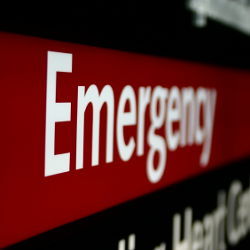
Veroniche
Western Region, US
Female, 54
I’ve been an ER nurse manager since 2009. Previously, I spent 24 yrs as an ER nurse. My hospital, a Level III trauma center, sees 70,000+ ER patients/yr. My responsibilities include billing, federal/state regulation oversight, metrics reporting, software education of e-records, and hiring/termination/disciplinary actions. The ER is one of the key impacted areas of healthcare reform. It’s a scary and exciting time for us, not just in the care of patients, but what the future holds for healthcare.
In any health care emergency setting, the patient is the decision maker. If the patient is unable to make decisions for themselves, the person that can make decisions next is the medical durable power of attorney. Hopefully people have that established before an emergency presents itself.
If the patient is unable to give any type of consent, the ER physician uses something called implied emergency consent (laws are different in every states) and will do what needs to be done to save the patient's life. If someone tries to influence the care of the patient when the patient is unable to consent, they have to have legal proof that they have been designated by the patient to make health care decisions on their behalf.
Every adult needs to designate someone as their health care power of attorney for those situations when the patient can't speak for themselves. The MPOA needs to know clearly what the patient would want in every kind of health care situation, so you need to know and trust the person that you select., because they might be making life or death decisions for you. Don't be afraid to discuss things like organ donation, blood transfusion, life support issues, etc.
I am not a lawyer, consult an attorney in the state where you live because laws vary.
That is generally the sad truth about management--you will be called upon to assist in the ED when staffing is short and they can't get an hourly nurse to come in. Generally managers are exempt from wage and hour laws and are paid a set salary that usually doesn't include overtime. It shouldn't be a regular, ongoing thing though; if it does, I would be concerned about your staffing. If there is a problem with the time and attendance of your staff, then that is a different issue that you are going to have to address as a manager.
The plus side about this is that you will get lots of bonus points from your nursing staff; you will be seen as someone that has their back, that understands front line nursing care, and it will keep your skills current. That will get respect from the nursing staff that will go a long way when you have to implement changes, or institute policies that affect them.
Hello bdog--I guess I am not exactly sure what you mean by "detox me." Treat you with antibiotics for the abscess? Detox you from what?
Every designated Emergency Department in the US is required to screen every person for a medical emergency. They will treat people regardless of their insurance, but that doesn't mean you will not get billed for the treatment, which can be very expensive even for a minor ailment. If you need a prescription they will prescribe medication, but you will need to get it filled at a pharmacy which you will have to pay for.
Some pharmacies such as Walmart (others also) have a low cost prescription program for commonly used medications, so that is an option. Good luck to you!
The challenges faced by this ED are similar to those all over the country. The two main concerns that we had identified by patient/staff complaint and national benchmark data are:
1. Inpatient boarding for those patients in the ED waiting for a hospital admission bed
2. Competitive market challenges to decrease the time a patient sees a doctor, and the overall length of stay in the ED
Because we have a robust EMR (electronic medical record), finding this data was easy to extrapolate. The data was collected for a six month period of time to show the time that the patient came in the door, when they were seen by the doctor, when the decision was made to admit the patient, and when the patient left the department. From this data, goals for improvement were identified, and Lean processes were implemented to shorten these times. The "Patient Flow Committee" now evaluates the data on a monthly basis to see if the ED is improving, or if there are new challenges identified. Now over 90% of the ED patients see a physician within 30 minutes of arrival.
The inpatient boarding times have shown fluctuation due to flu season, staffing challenges, etc, however the committee is able to identify which of the variables are affecting the times and work to adjust that part of the solution.
Great question, thanks!
School Teacher
 How do you see parents failing in their children's education?
How do you see parents failing in their children's education?
Private Detective
Zookeeper and Animal Trainer
 Which cuddly-seeming animals are actually dangerous to be around?
Which cuddly-seeming animals are actually dangerous to be around?
The ED staff is considered a mandatory reporter for instances of child abuse, elder abuse, domestic abuse, gunshot wounds so those are no brainers. I am not sure if the staff are required by law to report crimes that someone else tells them about. I would hope ethically that a person would do so, especially crimes against persons. I will check with someone about my pay grade and get back to you. I
Our ED has 60 beds, we are located in a suburban community non-profit, non-teaching hospital. In 2012 we had over 73,000 ED visits, which makes us the second busiest in our state. We are a designated Level III trauma center. We care for all ages of patients, from newborn to geriatric. We are a certified chest pain center, certified stroke center, and have a large psychiatric population. We also have started a Senior ER, an area within the main ER that focuses on the medical and social needs of patients over the age of 65.
When I was in nursing school, I was so sure that I wanted to be a pediatric nurse. Then I started those courses and realized that pediatrics wasn't for me. Go through your courses, start doing a lot of reading and research about different specialities, and it will come to you. There is no speciality in nursing that is "better" than another. Every person is unique and you need to find what fits you best. If you don't you will burn out fast. The great thing about nursing in this present day is that there are so many areas to focus on, there is something for everyone.
When you finish school and still aren't sure what area you want to focus in, I recommend getting a solid background in medical/surgical nursing with critical care training. Every specialty needs that as a basis anyway, and you need to get good at the assessment of patients, and basic nursing care along with critical thinking skills. Patients are so much more complex than they used to be, and the technology in caring for them changes daily.
Good luck with nursing school and the Army!
-OR-
 Login with Facebook
Login with Facebook (max 20 characters - letters, numbers, and underscores only. Note that your username is private, and you have the option to choose an alias when asking questions or hosting a Q&A.)
(A valid e-mail address is required. Your e-mail will not be shared with anyone.)
(min 5 characters)
By checking this box, you acknowledge that you have read and agree to Jobstr.com’s Terms and Privacy Policy.
-OR-
 Register with Facebook
Register with Facebook(Don't worry: you'll be able to choose an alias when asking questions or hosting a Q&A.)